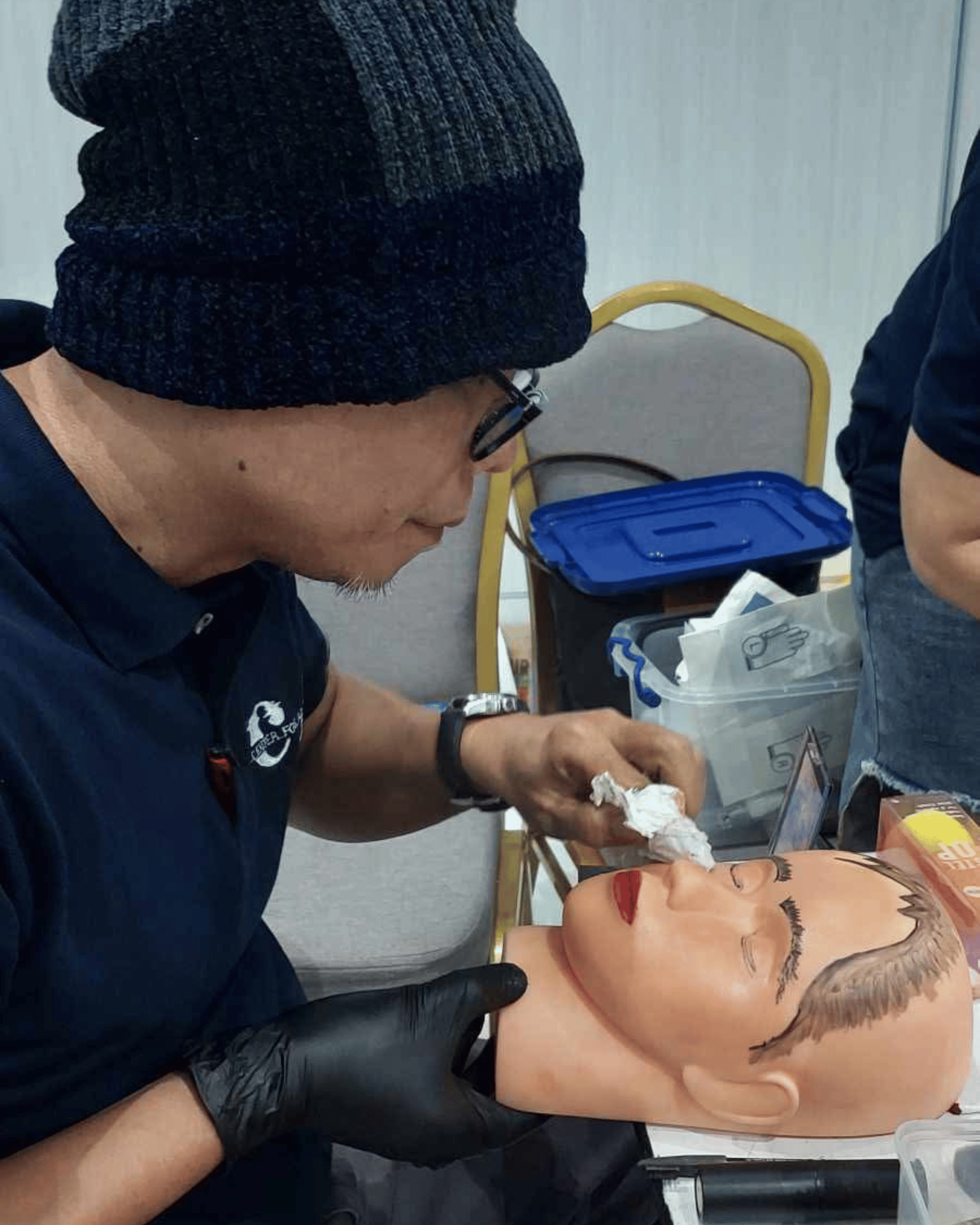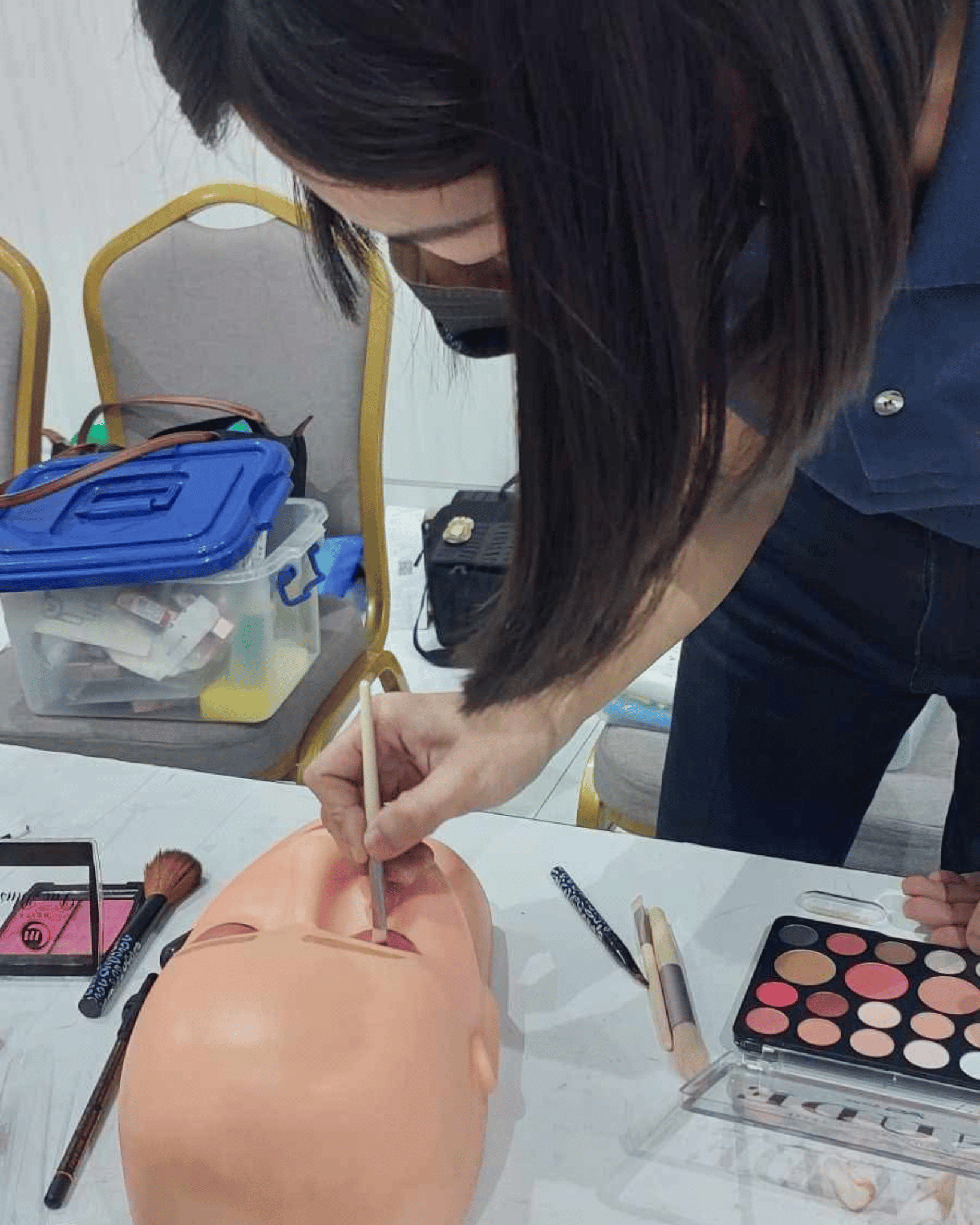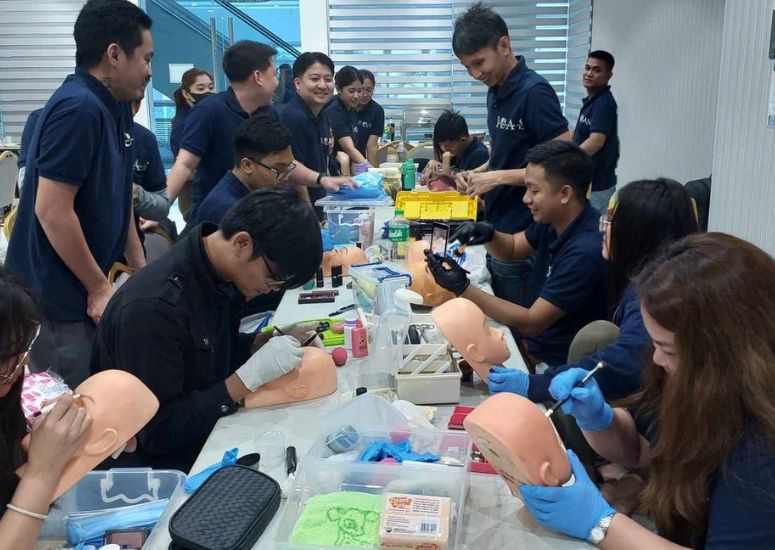This mortuary school empowers embalmers and lets you give new life to expired makeups
If you're a makeup junkie, it’s inevitable to have a huge collection of beauty products—from blush, powder, to different shades of lippies—but there are times when some of them just end up getting buried and left to expire, especially if the shade or formula doesn’t match your liking.
Instead of throwing away old makeup, you can give it another life by donating it to mortuary schools like the Pacific Center for Advanced Studies, where student morticians practice their skills in funeral cosmetology.
Accredited by the Department of Health, PCAS launched an initiative dubbed Heaven Palette, which aims to help not just the deceased and their surviving family have that “closure” with the help of good mortuary makeup, but also to elevate the practice of embalming in the Philippines.
“You know, most often, you think of makeup usually to enhance the beauty of the living. But now, in this heavenly campaign, it enhances the deceased, the loved one, and [shows] that even in death, you can be beautiful,” Sarah Reyes, owner and president of PCAS, told PhilSTAR L!fe.
The initiative started in December 2024 when the TBWA\ SMP agency pitched the idea of reusing pre-loved or expired cosmetics to help students, especially those who are less fortunate, to ease the expenses of going to a mortuary school.
“We've already been encountering students having issues with makeup, not just because of the cost, but because of a lack of time. They came from different provinces, so hindi accessible 'yung mga stores for them, like there's no big malls for them to do their shopping and once they go here or in Manila or in Cebu, they're more focused on attending the classes and doing their hands-on lecture,” said Kat Mercado, a licensed embalmer and PCAS instructor.
The cosmetology program

PCAS Phl / Facebook
According to Reyes, student morticians undergo intensive weeks to study embalming and other related topics like anatomy, physiology, chemistry, microbiology, hygiene and sanitation, and instrumentation.
The upcoming training in September will kick off their extended 13-week training. Four weeks will be spent on practical sessions where students will be taught how to disinfect, preserve, and restore dead bodies. They will also be introduced to different instruments, cosmetic types, styles, and techniques in embalming.
“It deals with a lot of understanding not just memorization,” Reyes said, noting that it caters to all kinds of students: those who don't have a background in medicine, degree holders, fresh graduates, and even older individuals who are looking to give it a shot.
More than the technical part, the training also includes a holistic approach by putting a spotlight on ethics.
“PCAS puts emphasis on the ethical part of embalming. It's part of the guidelines of the DOH because a lot of those who aren't exposed in the death care industry, they think na we are just cutting up bodies left and right. We have to explain to them that we are handling loved ones of real families, so you have to carry yourself in a professional manner even though you are still a student," Mercado told L!fe.
Reyes added that training includes modules and immersion on teaching empathy, which includes exposing them to bereaved families under the supervision of licensed embalmers.

PCAS Phl / Facebook
“Before we actually allow embalmers the students to go into the room or the embalming care center, they're exposed to families. And I'm sure with that, seeing the families [is] already a test of how to show empathy, how to relate to the family,” she explained.
Students also follow an agreement and strict guidelines about confidentiality, which prohibit the taking and sharing of photos and videos.
“This kind of teaching will set the pace, set the mindset of how they will perform when they are in their respective funeral homes,” she added.
The training also has a debriefing process that allows students to process and understand how they feel when they are practicing embalming.
“We're doing both a scientific and an emotional approach. We let them talk about what they observed on the body, how they felt during their embalming process,” Mercado said, adding that they also encourage students to think outside the box when giving solutions to certain scenarios. “It allows discussion and also hindi nila dinadala ‘yung mabigat na feeling.”
The whole training costs P30,000. For the licensure exam, students must be aged 18 and above, at least a high school graduate or completer of the Alternative Learning System.
Empowering embalmers, one makeup kit at a time

Reyes said the Heaven Palette initiative promotes sustainability—from reducing environmental harm by reusing expired makeup to sustaining the embalming community. More than this, it's also a way to elevate the profession of embalming, which Mercado said is often underappreciated.
“There has always been this stereotype of how an embalmed body looks, 'yung finished product especially, may previous techniques where the end result does not look similar dun sa loved one nila,” Mercado said, noting that it’s not just a skill issue, but also access to necessary materials like using different cosmetics and learning techniques to elevate embalming.
Reyes, meanwhile, noted that embalming is crucial as it helps families have that closure in their final moments with their departed loved ones, saying that it also helps with their mental health.
“Seeing that body in a restful state can give that peace of mind, [making] you more relieved,” she said.
“A community cannot thrive without embalmers. I look at it as a profession; it might not take a lot of years to do, but the impact of these professionals—the existence of these embalmers—has on the community is very vital to the well-being, the sanity, and for moving forward,” she added.
Mercado echoed this, saying that the profession also helps families have more time before bidding farewell to their deceased loved ones.
“Filipinos are famously known for having very long wakes because they're waiting for their relatives to fly in from the province, from different countries. So those who cannot be here when that person was still alive, they can do so, and that's through embalming,” she said. “If the body is prepared well, the cosmetics are pristine, you're able to do all the necessary steps, you help that family.”
How to help
For donations, PCAS is accepting cream foundations, blush and eye makeups, pencil or gel liners, loose powders, and lip products that are expired but in good condition—meaning, without unusual texture, smell, or change in consistency. Powdered makeup products are preferred, but a sturdy cream-based makeup product will also be accepted.
The mortuary school is also accepting unused or sanitized brushes and sponges.
You may drop off or send your donations at PCAS, c/o Cosmopolitan Memorial Chapels and Crematory, 332 G. Araneta Ave., Brgy. Dona Imelda, Quezon City and contact Kat Mercado at 0945 366 7404.
For those who are in Cebu, you may send donations to PCAS, c/o Cosmopolitan Memorial Chapel, Nivel Hills, Lahug, Cebu City, and reach out to Niña Delos Reyes at 0960 284 2853.
PCAS is accepting donations 24/7 both in-person and via delivery. If via courier, note that you'd have to make the booking and shoulder the necessary fees.


